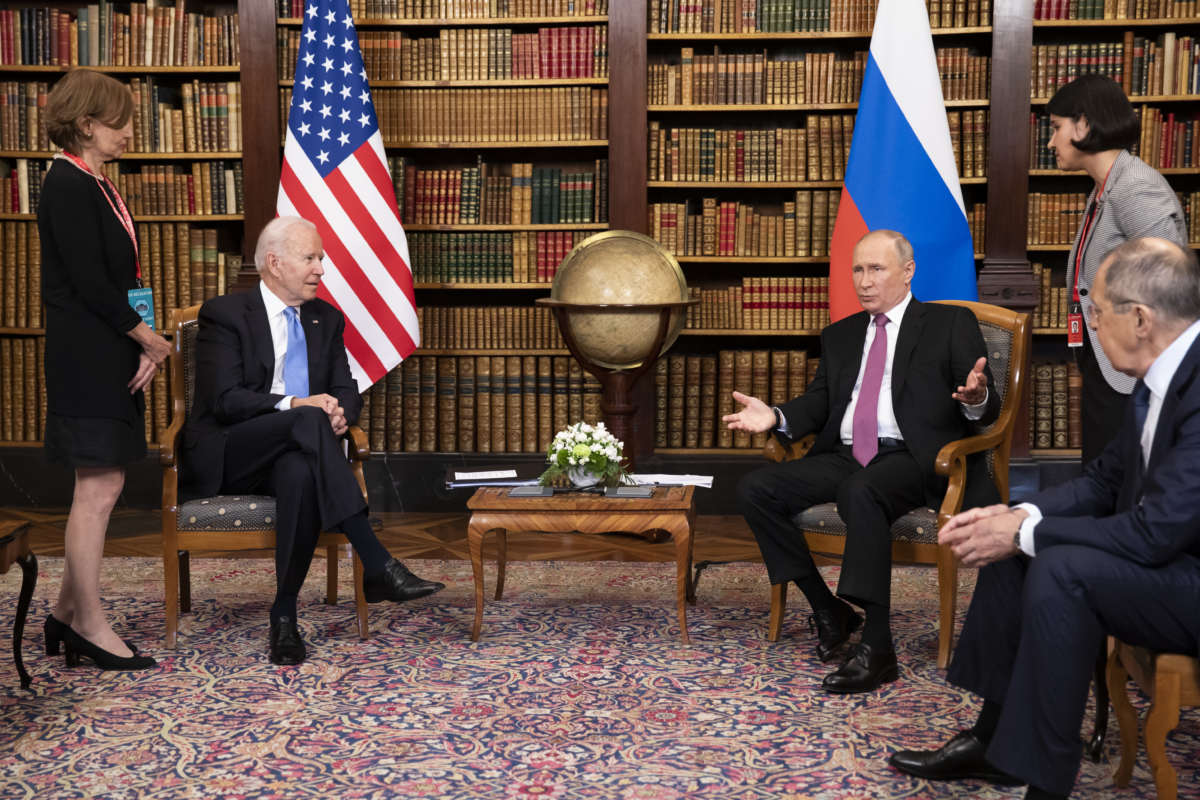U.S. President Joe Biden and Russian President Vladimir Putin on Sunday agreed “in principle” to hold a summit on Ukraine as global fears of a war involving the two nuclear-armed powers remain high.
In a statement, the office of French President Emmanuel Macron — who spoke separately with Putin and Biden on Sunday — said that both leaders accepted the idea of the summit, though the precise details have yet to be agreed upon.
Medea Benjamin, co-founder of the U.S.-based peace group CodePink, applauded Macron for brokering the diplomatic effort.
“If he can get Putin and Biden to meet, if he can stop a war in Ukraine, he will be a hero,” Benjamin wrote in a Twitter post.
The White House confirmed late Sunday that Biden “accepted in principle a meeting with President Putin,” which could take place following a scheduled meeting between U.S. Secretary of State Antony Blinken and Russian Foreign Minister Sergey Lavrov in Europe later this week.
But preparations for a summit will only move forward if a Russian invasion of Ukraine “hasn’t happened,” the White House said, adding that it is “ready to impose swift and severe consequences” in the event of an invasion.
The Kremlin, for its part, cautioned that there are not yet “concrete plans” in place for a Putin-Biden summit on Ukraine. According to the Kremlin press service, a topic of discussion between Putin and Macron on Sunday was “NATO countries’ steps aimed at pumping Ukraine with advanced weapons and ammunition.”
Speaking at a press briefing, Kremlin spokesperson Dmitry Peskov said a firm decision for a Putin-Biden summit “can be made at any moment,” noting that “clearly, tensions are rising, and active contacts are continuing.”
“The situation is indeed extremely tense, and so far we see no signs of a decrease in the level of tension,” Peskov continued. “Provocations, shelling are becoming more and more intense, of course, this causes very deep concern.”
Russia has repeatedly denied claims that it is plotting an imminent invasion of Ukraine, a purported plan that U.S. officials say is backed by intelligence that they have thus far refused to make public. Biden said Friday that he is “convinced” Putin has decided to invade Ukraine in “the coming days.”
White House Press Secretary Jen Psaki echoed the president on Sunday, saying in a statement that “currently, Russia appears to be continuing preparations for a full-scale assault on Ukraine very soon.”
Anatoly Antonov, Russia’s ambassador to the U.S., denied the White House’s assertion earlier Sunday, telling CBS: “There is no invasion. There [are] no such plans.”
“Russia has publicly… declared its readiness to continue the diplomatic efforts to resolve all outstanding issues,” Antonov added. “Russian troops are on sovereign Russian territory. We don’t threaten anyone.”
Our most important fundraising appeal of the year
December is the most critical time of year for Truthout, because our nonprofit news is funded almost entirely by individual donations from readers like you. So before you navigate away, we ask that you take just a second to support Truthout with a tax-deductible donation.
This year is a little different. We are up against a far-reaching, wide-scale attack on press freedom coming from the Trump administration. 2025 was a year of frightening censorship, news industry corporate consolidation, and worsening financial conditions for progressive nonprofits across the board.
We can only resist Trump’s agenda by cultivating a strong base of support. The right-wing mediasphere is funded comfortably by billionaire owners and venture capitalist philanthropists. At Truthout, we have you.
We’ve set an ambitious target for our year-end campaign — a goal of $230,000 to keep up our fight against authoritarianism in 2026. Please take a meaningful action in this fight: make a one-time or monthly donation to Truthout before December 31. If you have the means, please dig deep.
